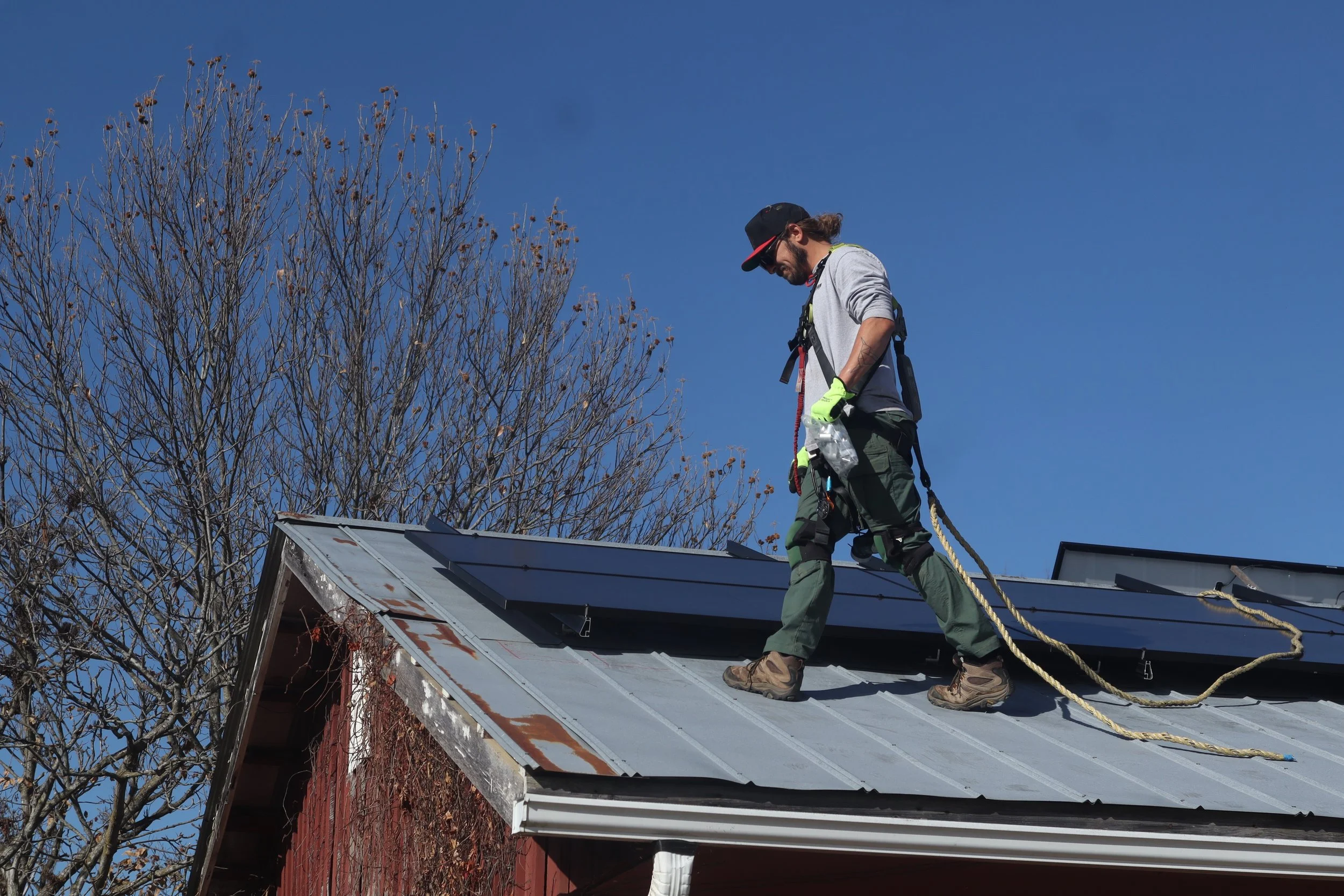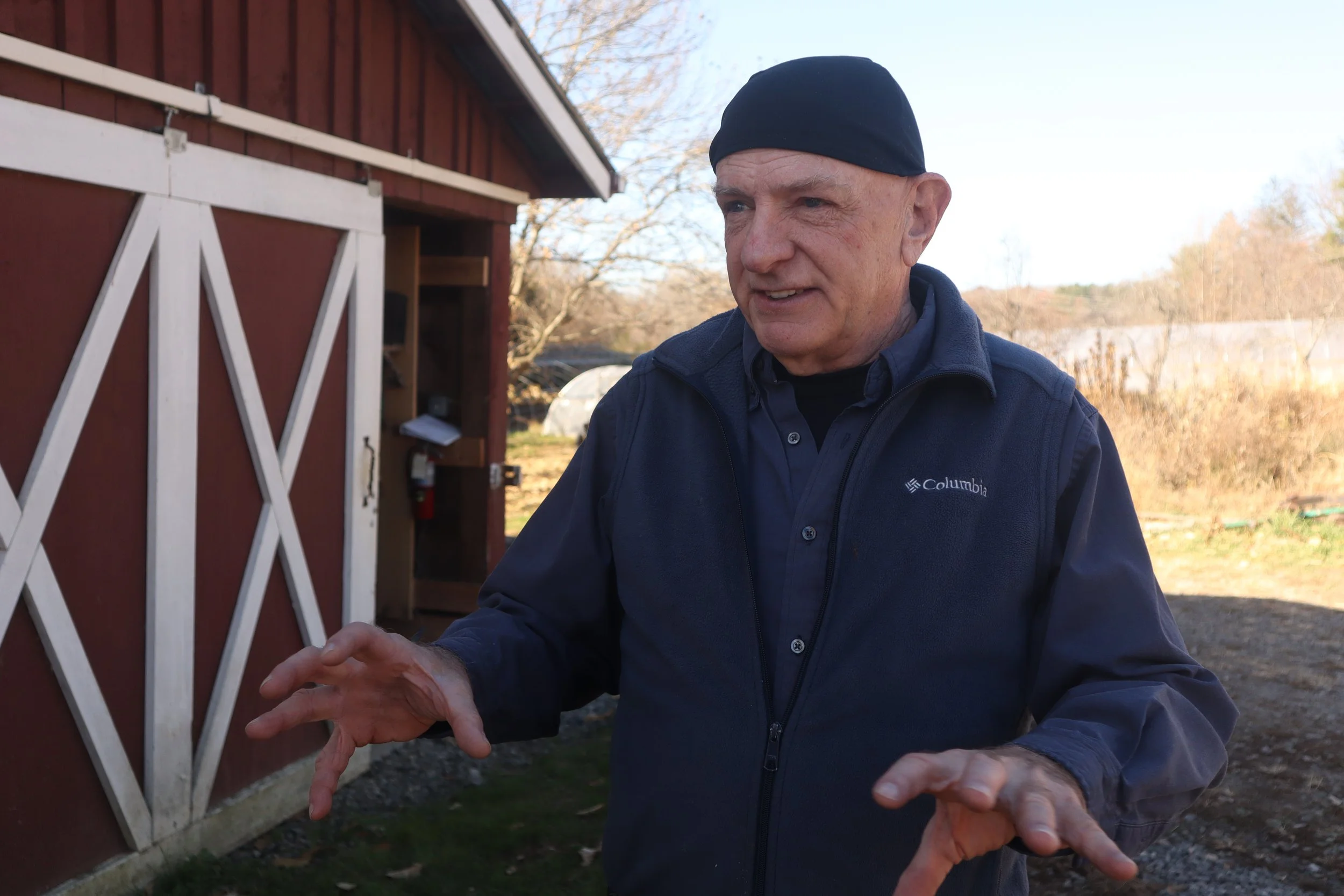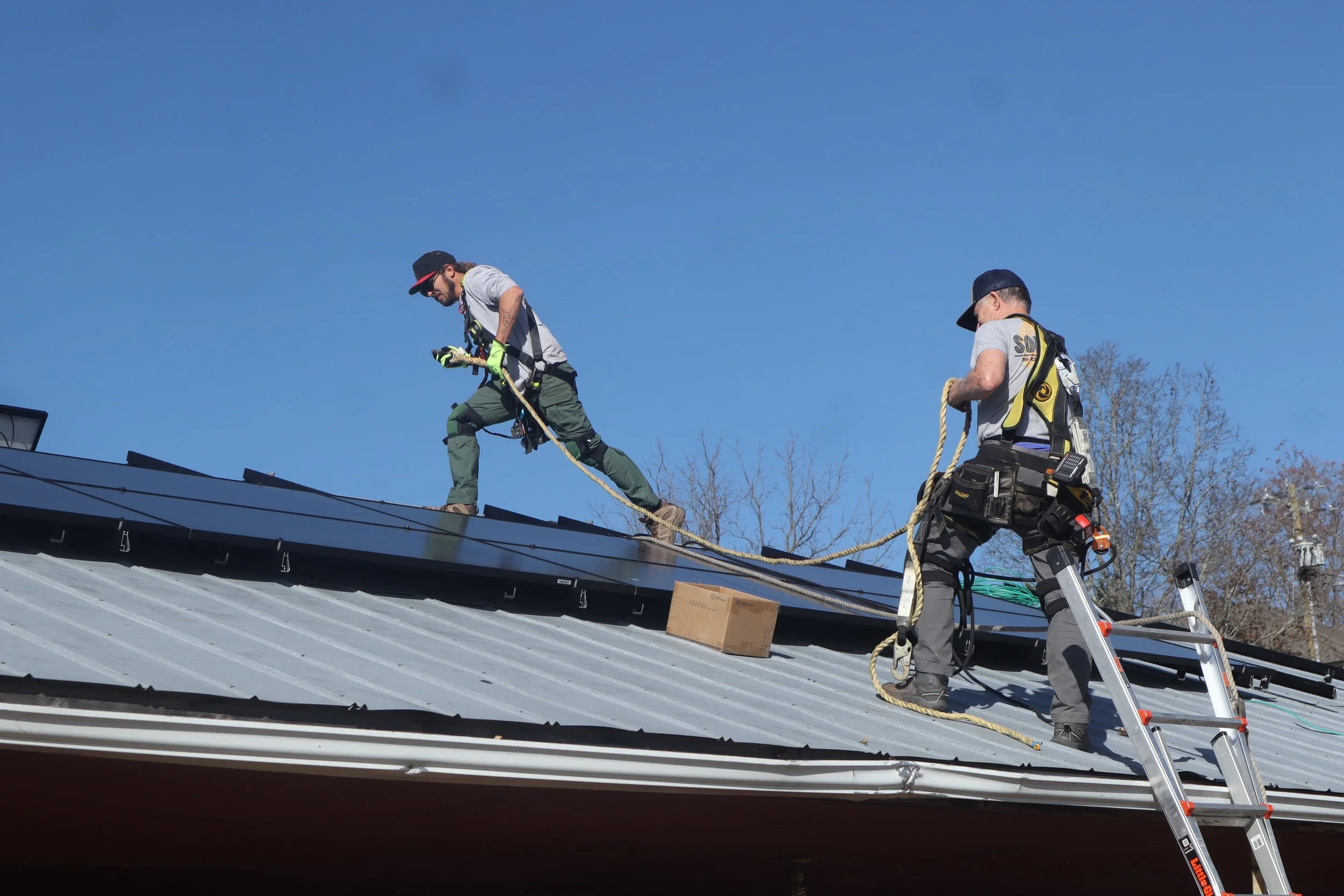Solar Charging Shed Paves the Way for Warren Wilson College Decarbonization
Emily Cobb | December 6, 2023
Warren Wilson College (WWC) has launched into the second phase of its plan to decarbonize all of its 900-acre land operations with a solar charging shed.
The project has been a long time coming with the center for working lands partnering with local Fairview company, SolFarm. Also assisting is the Critical Services Microgrid Group, a pro bono Asheville group who are trying to promote microgrids in the region.
Some of the funding has been provided by the band Pearl Jam.
The school has a partnership with Solectrac, a California company who have started to produce electric tractors in Denton, N.C. Two new electric tractors will be turned into solar tractors through the microgrid and will be used by the garden and landscaping crews.
The tractors are 25 horsepower and have a front-end loader and a backhoe on them.
Dave Ellum, the dean and director of the center for working lands, has been spearheading the colleges’ decarbonization plan. As the director, he oversees all land and sustainability work.
With this plan, the goal is to become a demonstration site for testing new innovations in decarbonization. Another one of Ellums goals is taking all land operations south of the south service road completely off of fossil fuels.
“We can try these new innovations, see what works and what doesn't work as long as it's acceptable risk, and now farmers can come here and say, ‘All right, let me test that tractor. Let me see how this agrovoltaics works — we can assume the risk so farmers don't have to,” Ellum said. “How do we demonstrate climate-friendly agriculture and forest and land management through the Center for Working Lands? How do we not only transfer this to the students but how do we transfer it to landowners? And in a perfect world, we teach the students, students teach landowners.”
Keith Thomson works for Critical Services Microgrid Group and is volunteering to assist with WWC’s sustainability projects. He has been in contact with Ellum for years and serves as a volunteer for this project.
Keith Thomson
The group and Thomson have been working with Ellum to plan the best course of action to decarbonize WWC land operations. He assisted with completing Phase 1 of WWC's plan to decarbonize the school.
Phase 1 consisted of the solar mobile microgrid work vehicles — a collaboration with University of North Carolina Asheville (UNCA) mechatronic engineering students. The project used old golf carts that had their batteries replaced with lithium iron phosphate ones and solar charging systems, which also provided mobile charging for battery tools.
Kelly Gloger is also part of the critical services micro group. He was on the roof installing the panels as well as teaching students how to do so throughout the process. He is the lead salesman at SolFarm.
Kelly Gloger on roof
Thomson pointed out how these programs are an important part of improving the college and upholding its commitment to sustainability.
“Point being, things change,” Thomson said. “Choosing good change, and not settling for whatever happens. We can live in despair because we can't do anything about it, but that's not the way Warren Wilson works, right? Hands-on experiential learning, thinking and doing is what we do.”
Mike Diethelm is a WWC alum of 1992 and graduated with a degree in environmental studies. He started SolFarm in 2012 and has been working both in the field and in the office on this microgrid project. This is a step in the right direction for him, as WWC had an array of solar panels before he attended WWC.
Diethelm touched on the importance of getting WWC students involved in this project.
“Well, I mean, [students] have got to bring this technology out to the real world when they're done [with school],” Diethelm said. “And it needs to be [out] there ASAP. It also, I think, is a game changer for the local farms around here. Because, you know, we'll have a model for them to follow that's a renewable energy path.”
SolFarm is handling the solar voltaics for the microgrid, the inverters and the batteries. Some of Diethelm's favorite aspects of the project are the student involvement and the location. The microgrid is placed on the roof of the horse barn, nestled between the Swannanoa River and the garden.
Part of the reason SolFarm got the contract was because of their business model and their willingness to write in their contract that they would allow students to assist whenever they could for this project.
Caleb Counter is a senior on the Forestry Crew and worked a few of their shifts assisting with the solar panel installation. They followed the direction of SolFarm employees, which included learning how to install hardware for the microgrid. They enjoyed learning about the solar industry and its future and the innovation behind the project.
“I hope that as we start using these solar vehicles, producing our own solar energy is going to help with some of our operating costs,” Counter said. “Obviously, environmental wise, if you're not burning gas and diesel, all day, every day during the workweek that's gonna have an environmental impact.”
On the subject of gasoline and diesel, Thomson pointed out that the current tractors used on campus use fossil fuels such as these, which contributes negatively to individuals' health and the environment.
“Exhaust from a combustion engine, whether it's gasoline or diesel, the fumes from that, especially the carbon monoxide, is a poison,” Thomson said. “And if you sit on one of those things while it's running, and driving, you're gonna get a headache, and it's called carbon monoxide poisoning. The electric tractors do not have a tailpipe, and when they're being charged from the solar system, there is no effluent coming out of the natural gas combustion electric generation unit over at Lake Julian.”
Not only will the microgrid help power the two electric Solectrac tractors the college has for the garden and landscaping crews, but it will also help power the tools that the landscaping crews use like weed whackers and leaf blowers.
“Something might cost more initially, but the payback is from savings directly to your own budget,” Thomson said. “And then you're not asphyxiating the driver, or contributing to a whole global supply chain of mining and combustion of fossil fuels that make a one-way trip to the atmosphere and can't be recycled, [as opposed to] battery materials that will be recycled indefinitely. That is the advantage of electrification.”
This microgrid installation is only the beginning of the school’s decarbonization plan. The plan is to have a one-acre agrovoltaic site that would allow WWC to grow food, and do research on which types of crops work in that system.
Unlike regular solar panels which use up a lot of land — limiting food production — agrovoltaic systems bypass that need.
“Agrivoltaics is a way to co-locate solar panels and still grow food,” Ellum said. “What happens now with solar farms is we put the solar panels really close together, really low to the ground, and we put gravel or grass under them. People don't like that because it takes arable land that could be used for agriculture out of agriculture, and into solar farms. What co-locating through agrovoltaics allows you to do is lift up the panels, and spread the panels out.”
Ellum hopes that this decarbonization plan and implementation of agrovoltaics will encourage others in Western North Carolina to do the same.
“We're in this place now in society where we do things the way we do them,” Ellum said. “And we think that, from a climate point of view, we have to develop technology that allows us to keep doing what we're doing right now. We have to give a little bit — it's not that the technology has to adapt to us, so we can keep on business as usual. We have to realize that as a society, we may have to adapt how we do things to the available technology. And that takes a little more humility than people tend to have sometimes. So yeah, you might have a tractor that you need to stop in the middle of the day, charge it before you finish your work. People are like 'I can't do that.' We're gonna have to do that.”
As this decarbonization plan progresses, Ellum hopes that students will play a large role in it.
“When we do this [the decarbonization plan], it's not just about students who are interested in electricity, or students that are interested in solar,” Ellum said. “I'm hoping to get students that are interested in any facet of this work to come see me to help out. Because I'll tell you right now, with our climate issues, it's not the science and the technology that's gonna save us, it's changing people's behaviors. So I'm hoping sociology students, psychology students, philosophy students, art students, writing students are like, Hey, how can we get into this project with you and help support it?’”




